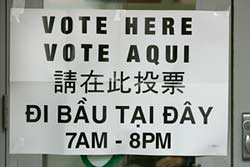Asian Americans could play key role in the presidential race, study shows
America’s fastest-growing ethnic grouping may spell the difference in swing states
| 10 October 2008
![]() BERKELEY — Many Asian American voters are supporting Democratic presidential candidate Barack Obama, but another sizable portion remains undecided — a development that could set the stage for Asian Americans to play a pivotal role in the outcome of the election, according to a new national survey released this week.
BERKELEY — Many Asian American voters are supporting Democratic presidential candidate Barack Obama, but another sizable portion remains undecided — a development that could set the stage for Asian Americans to play a pivotal role in the outcome of the election, according to a new national survey released this week.
The groundbreaking study was conducted by researchers from Berkeley, UC Riverside, Rutgers, and USC. The researchers’ 2008 National Asian American Survey (NAAS) shows that 41 percent of Asian Americans are likely to favor Obama, while 24 percent support John McCain. In battleground states, where either candidate could win on Election Day, Obama leads with 43 percent of Asian Americans supporting him to 22 percent favoring McCain.
Researchers point out that a key finding of the study is the high proportion of undecided Asian American voters: 34 percent. Among the general population, national polls conducted since the major-party conventions show that undecided voters are approximately 8 percent of the electorate.
 Karthick Ramakrishnan, an associate professor of political science at UC Riverside, points out that “with such a high proportion of undecided voters, Asian Americans are a critical source of potential votes for either candidate in the final weeks of the campaign.”
Karthick Ramakrishnan, an associate professor of political science at UC Riverside, points out that “with such a high proportion of undecided voters, Asian Americans are a critical source of potential votes for either candidate in the final weeks of the campaign.”
Next to Latinos, Asian Americans are the fastest-growing share of the U.S. population. Currently, they comprise 5 percent of the population and, according to the researchers, will likely play a significant role in battleground states such as Virginia, Nevada, and Washington, where they account for 5 percent or more of the population. Even in states such as Colorado, Ohio, and Florida, where they are less numerous, Asian Americans may provide the margin of victory, the researchers said.
Even in battleground states and among those Asian Americans who were interviewed in the second half of September, more than 30 percent were undecided between Obama and McCain, he says.
The multi-ethnic, multilingual survey of more than 4,000 Asian Americans likely to vote in the election was conducted from Aug. 18 to Sept. 26. It is the most comprehensive survey to date of the political views of Asian Americans, with interviews conducted in English, Cantonese, Mandarin, Hindi, Japanese, Korean, Tagalog, and Vietnamese.
Janelle Wong, an associate professor of political science at USC, says that “most national polls cannot report the preferences of these likely voters because they do not interview in multiple languages, and the number of interviews they conduct among Asian Americans is very small.”
By drawing on the knowledge of political scientists with expertise in survey research and ethnic politics, and with support from several foundations, the NAAS data provide insight about Asian Americans as a whole, the researchers say, as well as about their six largest ethnic subgroups: Asian Indians, Chinese, Filipinos, Japanese, Koreans, and Vietnamese.
The research shows that support for the candidates does vary among Asian American ethnic groups. Among those who have made up their minds on a candidate, two-thirds of Vietnamese Americans support McCain; Japanese Americans, Chinese Americans, and Indian Americans support Obama by more than a 3 to 1 ratio; and Korean and Filipino Americans who are likely voters also support Obama over McCain, but the gap is much smaller, with ratios less than 1.4 to 1.
As Berkeley associate professor of political science Taeku Lee says, “A very large number of Asian Americans are nonpartisan. The Asian American vote is very much up for grabs: Nonpartisans who see either the Democratic or Republican party as closer to them on issues that matter to them are much likelier to vote for that party’s candidate.”
Among the survey’s other findings:
- The majority of Asian Americans who voted in the primaries supported Hillary Clinton over Obama by nearly 2 to 1, but Clinton supporters now overwhelmingly plan to vote for Obama rather than for McCain by a 59 percent to 10 percent margin among likely voters.
- About 80 percent of likely voters who are Asian American list the economy as one of the most important problems the nation faces, followed by the war in Iraq. On both issues there are strongly divided opinions between Obama and McCain supporters. “Even as the Iraq war has receded from the headlines as concerns about the economy have become more prominent, the war still plays a powerful role in the Asian American choice for president,” says Jane Junn, an associate professor of political science at Rutgers.
- Overall, 32 percent of all Asian Americans identify themselves as Democrats; 14 percent as Republicans; 19 percent as independents; and 35 percent as nonpartisan, not fitting into any of the major party categories.
- One-third of Asian American citizens get information about politics from Asian-language media; 28 percent say they would use Asian-language ballot materials.
The full NAAS report, including information on the survey methodology used, is online at www.naasurvey.com.

